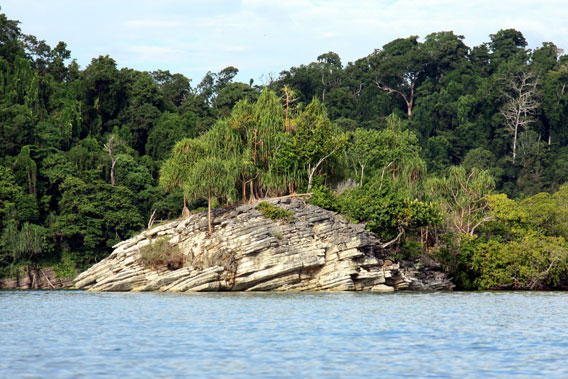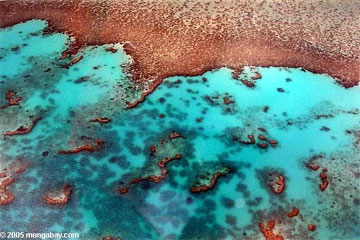Sites: news | india | latam | brasil | indonesia
Feeds: news | india | latam | brasil | indonesia
location: East Timor
Social media activity version | Lean version
When seas turn rough, gleaning keeps the fish on the table for some communities
- Communities living close to hard-bottomed shallow shore are more likely to catch animals for seafood consumption in the rough season when other types of fishing often aren’t possible, a new study has found.
- The study also found that shallow habitat mattered: the larger its extent, the more households glean.
- The results further suggest that worsening sea conditions due to climate change will increase the importance of coastal gleaning.
- The authors say that understanding the interactions between people and coastal ecosystems through fishing activities, such as gleaning, is essential for ensuring coastal management that supports social objectives.
Timor-Leste: With sacrifice and ceremony, tribe sets eco rules
- On an August morning in 2012, about 150 men, women and children gathered at a sacred spot in the village of Biacou, in northern Timor-Leste. With sacrifices of a goat and a pig and the blessing of the land and sea spirits, the community inaugurated the village’s tara bandu, a customary law of the indigenous Maubere that governs how people interact with the environment.
- Tara bandu was outlawed under the Indonesian occupation that lasted from 1975 until 1999. Since then, Maubere communities across the country have been bringing tara bandu back to life as a way to guide more sustainable use of their local natural resources.
- In Biacou, at least, the tradition appears to be resonating with residents as there has been just one violation of the tara bandu in the six years since its inauguration.
- This is the third story in Mongabay’s three-part profile of the Maubere’s revival of tara bandu.
Timor-Leste: Q&A with a Maubere fisherman on reviving depleted fisheries
- Timor-Leste is trying to figure out how to sustainably tap its fisheries and other valued marine resources.
- In one of the most interesting and successful local efforts, several communities have been reviving the ancient customary law of tara bandu, a means of regulating the use of natural resources common to Timor-Leste’s Maubere indigenous tribes.
- Six years have passed since the village of Biacou established its tara bandu to protect and better manage its fisheries and coral reefs. To understand how the revitalized tradition has affected Biacou’s fisherfolk, Mongabay spoke to Fernando da Costa, a seasoned fisherman from the village.
- This is the second story in Mongabay’s three-part profile of the Maubere’s revival of tara bandu.
Timor-Leste: Maubere tribes revive customary law to protect the ocean
- Traditional laws governing the management of natural resources known as tara bandu were outlawed during the Indonesian occupation of Timor-Leste. Since the country gained independence in 2002, it has been reviving the tradition in an attempt to control the exploitation of its forests and oceans.
- There are signs tara bandu has had a positive effect on some local forest, mangrove and coral reef ecosystems.
- Esteem for tradition seems to outweigh the adverse effects tara bandu has had on some people’s livelihoods, encouraging respect for the law.
- This is the first story in Mongabay’s three-part profile of the Maubere’s revival of tara bandu.
Fishing with insecticide-laced mosquito nets is a global phenomenon
- In regions of the world threatened by malaria, bed nets treated with insecticides are an increasingly common public health tool to fend off mosquitos.
- But there is growing evidence that the nets, often provided for free or at a subsidized price by hospitals and aid organizations, are being put to other uses, including fishing.
- A new study is the first to document just how common fishing with mosquito nets may be, finding that people in countries around the world are doing it.
- The practice could have significant environmental and socioeconomic implications.
Atauro island has highest average reef fish diversity in the world
- Conservation International’s (CI’s) Rapid Assessment Program (RAP) conducted a week-long survey was conducted in Atauro Island in July.
- During the course of the survey, CI’s team recorded a total of 642 reef fish species around the island.
- In one site, the team identified 315 species, which is the third highest globally, the researchers say.
New book series hopes to inspire research in world’s ‘hottest biodiversity hotspot’
 Pristine coastal vegetation: Misool island, Raja Ampat. Photo by: Dimtry Telnov, 2009. Entomologist Dmitry Telnov hopes his new pet project will inspire and disseminate research about one of the world’s last unexplored biogeographical regions: Wallacea and New Guinea. Incredibly rich in biodiversity and still full of unknown species, the region, also known as the Indo-Australian […]
Pristine coastal vegetation: Misool island, Raja Ampat. Photo by: Dimtry Telnov, 2009. Entomologist Dmitry Telnov hopes his new pet project will inspire and disseminate research about one of the world’s last unexplored biogeographical regions: Wallacea and New Guinea. Incredibly rich in biodiversity and still full of unknown species, the region, also known as the Indo-Australian […]
U.S. pledges $40M toward coral reef conservation.
 U.S. pledges $40M toward coral reef conservation U.S. pledges $40M toward coral reef conservation mongabay.com October 23, 2008
U.S. pledges $40M toward coral reef conservation U.S. pledges $40M toward coral reef conservation mongabay.com October 23, 2008
Feeds: news | india | latam | brasil | indonesia
 Pristine coastal vegetation: Misool island, Raja Ampat. Photo by: Dimtry Telnov, 2009. Entomologist Dmitry Telnov hopes his new pet project will inspire and disseminate research about one of the world’s last unexplored biogeographical regions: Wallacea and New Guinea. Incredibly rich in biodiversity and still full of unknown species, the region, also known as the Indo-Australian […]
Pristine coastal vegetation: Misool island, Raja Ampat. Photo by: Dimtry Telnov, 2009. Entomologist Dmitry Telnov hopes his new pet project will inspire and disseminate research about one of the world’s last unexplored biogeographical regions: Wallacea and New Guinea. Incredibly rich in biodiversity and still full of unknown species, the region, also known as the Indo-Australian […] U.S. pledges $40M toward coral reef conservation U.S. pledges $40M toward coral reef conservation mongabay.com October 23, 2008
U.S. pledges $40M toward coral reef conservation U.S. pledges $40M toward coral reef conservation mongabay.com October 23, 2008